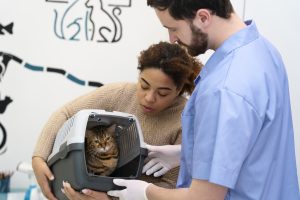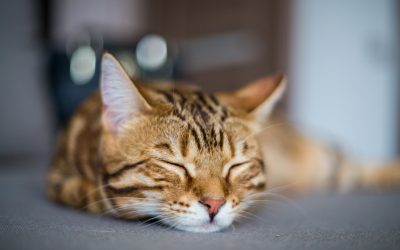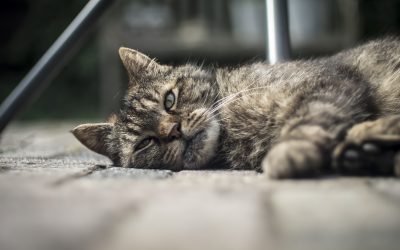FIV in Cats (Feline AIDS): Symptoms, Treatment & Cost
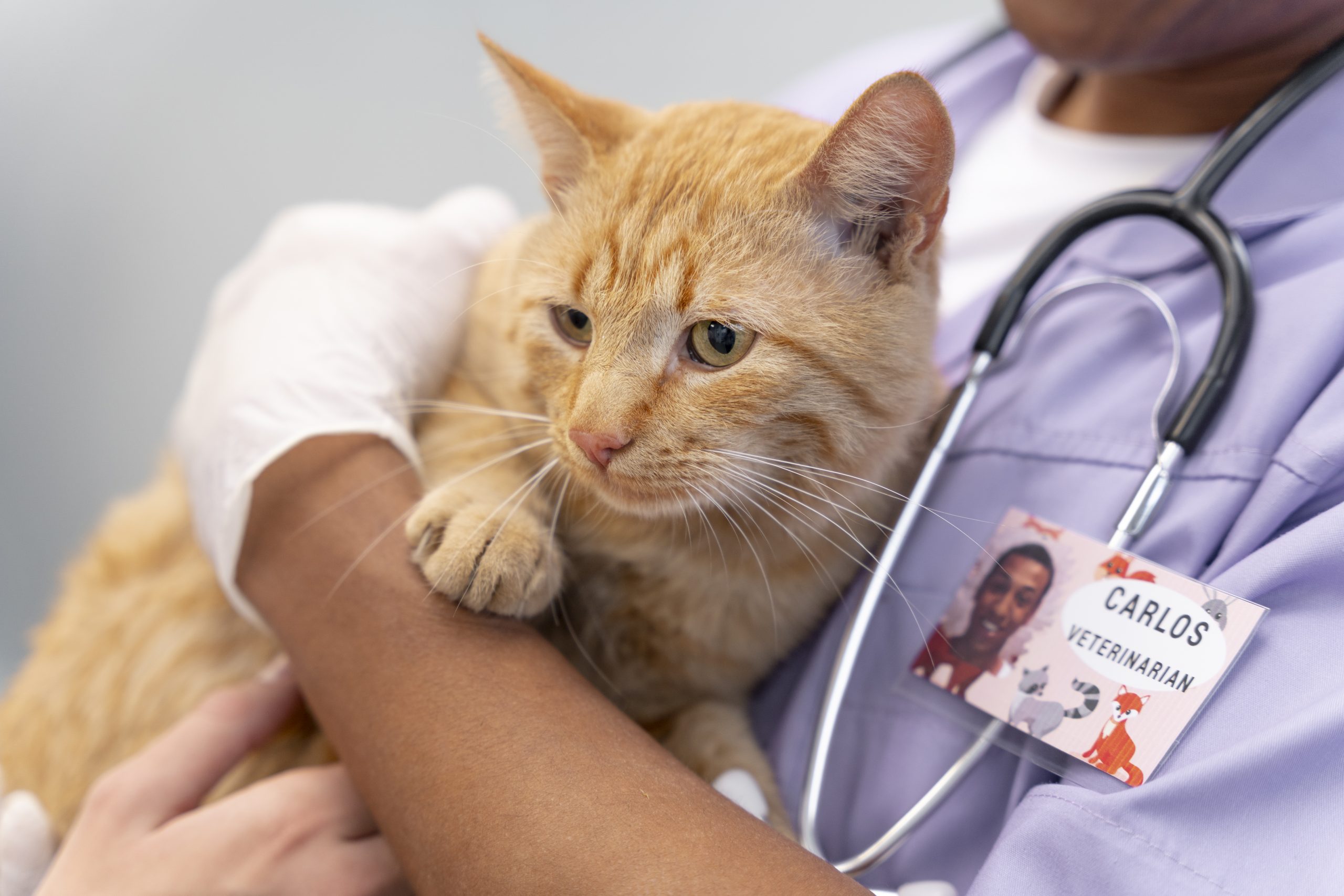
Feline Immunodeficiency Virus (FIV) is a viral infection that affects cats worldwide. It is similar to the Human Immunodeficiency Virus (HIV) in humans. FIV weakens a cat’s immune system, making them more susceptible to infections and diseases. The virus primarily targets the cat’s white blood cells, compromising their ability to fight off infections. Cat owners need to understand the symptoms, treatment options, and costs associated with FIV to ensure the health and well-being of their furry companions.
Is Feline AIDS the Same as FIV?
Feline AIDS is often used interchangeably with FIV, but it is important to note that they are not the same. Feline AIDS is a term used to describe the advanced stage of FIV infection when the cat’s immune system is severely compromised. Similar to HIV and AIDS in humans, FIV is the actual viral infection, while Feline AIDS refers to the disease progression. Not all cats infected with FIV will develop Feline AIDS, but it is a possibility if the infection is left untreated or unmanaged.
Is FIV Contagious to Other Cats?
FIV, or Feline Immunodeficiency Virus, is contagious among cats and is primarily transmitted through the exchange of bodily fluids such as saliva and blood. It often occurs during fights where bites are involved.
It is most commonly spread through bite wounds, so outdoor cats and those involved in fights are at a higher risk. The virus can also be transmitted from an infected mother cat to her kittens during birth or through nursing. It is important to note that indoor cats can also contract FIV if they contact an infected cat. Prevention measures such as keeping cats indoors and avoiding contact with unknown or infected cats can help reduce the risk of FIV transmission.
FIV is not easily transmitted through casual contact, such as sharing food bowls or grooming each other. While it is contagious to other cats, it cannot be transmitted to humans or other animals.
FIV Progression and Stages
FIV infection progresses in stages, with different symptoms and manifestations. In the early stage, cats may not show visible symptoms and can appear healthy. However, they can still transmit the virus to other cats. As the infection progresses, cats may start experiencing symptoms such as weight loss, fever, swollen lymph nodes, and poor coat condition. In the advanced stages, cats may develop opportunistic infections such as respiratory infections, dental disease, and chronic diarrhea. Monitoring FIV-positive cats closely and seeking veterinary care at the earliest signs of infection is crucial.
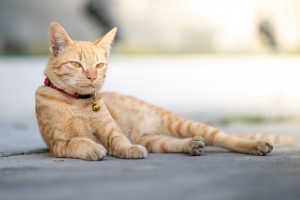
FIV Testing and Diagnosis
Testing and diagnosing FIV in cats is crucial for early detection and management of the infection. The most common test used for FIV diagnosis is the ELISA (Enzyme-Linked Immunosorbent Assay) test, which detects the presence of antibodies to the virus in the cat’s blood. A positive ELISA test result indicates the cat has been exposed to the FIV virus. Confirmatory tests such as the Western Blot test or PCR (Polymerase Chain Reaction) test may be conducted to confirm the diagnosis. It is important to consult with a veterinarian if you suspect your cat may be infected with FIV, as early detection can improve the chances of effective treatment.
Symptoms of FIV (Feline AIDS) in Cats
FIV can manifest in various symptoms in infected cats. In the early stages of infection, cats may not display any visible symptoms, making it challenging to detect the infection. As the disease progresses, common symptoms include weight loss, poor appetite, fever, swollen lymph nodes, oral infections, and chronic diarrhea. Cats may also experience recurring respiratory infections, eye problems, and skin infections. These symptoms can vary from cat to cat, and it is important to consult with a veterinarian for an accurate diagnosis if you suspect your cat may have FIV.
Advanced Symptoms and Opportunistic Infections
Due to their weakened immune systems, cats may develop opportunistic infections in the advanced stages of FIV infection. These infections are typically caused by bacteria, viruses, or fungi that the cat’s immune system would normally be able to fight off. Common opportunistic infections include respiratory infections, dental disease, chronic diarrhea, urinary tract infections, and skin infections. These infections can be severe and require immediate veterinary attention. Regular monitoring and prompt treatment can help manage these advanced symptoms and improve the quality of life for FIV-positive cats.
Treatment Options for FIV-Positive Cats
While there is no cure for FIV, treatment options are available to manage the infection and improve the quality of life for FIV-positive cats. Treatment primarily focuses on managing symptoms, preventing and treating opportunistic infections, and supporting the cat’s immune system. This may include antiviral medications, antibiotics, antifungal medications, and regular veterinary check-ups. Working closely with a veterinarian to develop a treatment plan tailored to your cat’s specific needs is important. Additionally, providing a stress-free environment, a balanced diet, and plenty of fresh water can help support the overall health of FIV-positive cats.
FIV (Feline AIDS) Prevention
Prevention plays a crucial role in managing FIV in cats. The most effective way to prevent FIV is to keep cats indoors, away from potential sources of infection. This reduces the risk of exposure to infected cats and fights that can lead to transmission. Spaying or neutering cats can also help reduce their urge to roam and engage in territorial fights. If you have multiple cats, it is important to introduce new cats slowly and monitor their interactions. Vaccination against FIV is available, but it is not 100% effective and is primarily recommended for cats at high risk, such as outdoor cats.
Cost of Managing FIV in Cats
Managing FIV in cats can incur various costs, including veterinary expenses and FIV-related emergencies. Regular veterinary check-ups, diagnostic tests, medications, and vaccinations are essential for the ongoing management of FIV. Additionally, FIV-positive cats may require specialized diets, supplements, and supportive care to maintain their health. These costs can vary depending on the infection’s severity and the cat’s needs. It is important to consider these expenses when adopting or caring for an FIV-positive cat to ensure that you can provide the necessary care and support.
Veterinary Expenses
Veterinary expenses for FIV-positive cats can include routine check-ups, vaccinations, diagnostic tests, and medications. These expenses are essential for monitoring the cat’s health, managing symptoms, and preventing opportunistic infections. The cost of veterinary care can vary depending on the location, the specific services required, and the veterinarian’s fees.
FIV-Related Emergencies
FIV-positive cats are more susceptible to infections and diseases, leading to emergencies requiring immediate veterinary care. Emergencies may include severe respiratory infections, severe dental disease, or other life-threatening conditions. The cost of emergency veterinary care, including diagnostic tests, medications, hospitalization, and surgical procedures, can be significant. It is crucial to be prepared for these potential emergencies and have a plan to ensure prompt and appropriate medical attention for FIV-positive cats.
Can Odie Pet Insurance Provide Coverage for Such an Investment?
Pet insurance can cover the diagnosis, treatment, and management of cat FIV if the cat was diagnosed after the policy was put in place.
Reimbursement
This method is the most common for pet insurance companies. You pay out of pocket for the veterinarian bill, and then the insurance company reimburses you for what’s covered under the insurance plan. The steps look like this.
- You pay the vet bill after your cat’s visit.
- You fill out the pet insurance claim form.
- Submit the claim form and other required documentation to the insurer.
- After the claim is approved, you will be reimbursed for eligible expenses.
Odie’s Illness and Injury pet health insurance plan offers comprehensive coverage for your cat.
What Does Odie Pet Insurance Cover?
Pet insurance covers various veterinary expenses, providing financial protection and peace of mind for pet owners. Here are the details of the coverage options offered by Odie Pet Insurance:
Illness & Injury Plan
The Illness & Injury Plan is an all-inclusive insurance plan designed to cover a wide range of medical needs for your pet. This plan includes comprehensive coverage for various illnesses, injuries, and veterinary services. Some of the covered items include:
- 24/7 Televet Chat
- Emergency vet visits
- Overnight hospital stays
- IV Fluids & Medications
- Medical Supplies
- Surgeries
- MRI/CAT Scans
- Rehabilitative Care
- Prescription Medications
- Gastrointestinal issues
- Laboratory Tests
Accident-Only Plan
The Accident-Only Plan is designed for pet owners seeking coverage specifically for accidents. This plan provides financial protection for emergency veterinary care resulting from accidental injuries. It includes 90% reimbursement up to $10,000 each year, with a $250 annual deductible.
Here’s an overview of the Accident-Only Plan:
- Coverage for broken bones, sprains, eye injuries, and traumatic dental fractures.
- Coverage for wounds, including bite wounds, lacerations, snake bites, and bee stings.
- Veterinary treatments covered for accidental injuries include X-rays & ultrasounds, laboratory tests, emergency care, hospitalization, CT scan & MRI, and surgery.
The Wellness Add-on Plan
The Wellness Plan is an add-on for routine care coverage you can purchase with an insurance policy. It focuses on preventive care and covers routine veterinary services. Odie has two wellness plan options available:
Basic Plan:
- Covers services such as spay/neuter and teeth cleaning, rabies vaccination, flea & tick prevention, heartworm prevention, vaccination/titer, wellness exam, heartworm test or FELV screen, blood, fecal, parasite exam, microchip, urinalysis or ERD, and deworming.
- Reimbursement up to $305 per year.
Plus Plan:
- Ideal for puppies and kittens.
- Covers services such as spay/neuter and teeth cleaning, rabies vaccination, flea & tick prevention, heartworm prevention, vaccination/titer, wellness exam, heartworm test or FELV screen, blood, fecal, parasite exam, microchip, urinalysis or ERD, and deworming.
- Reimbursement up to $535 per year.

